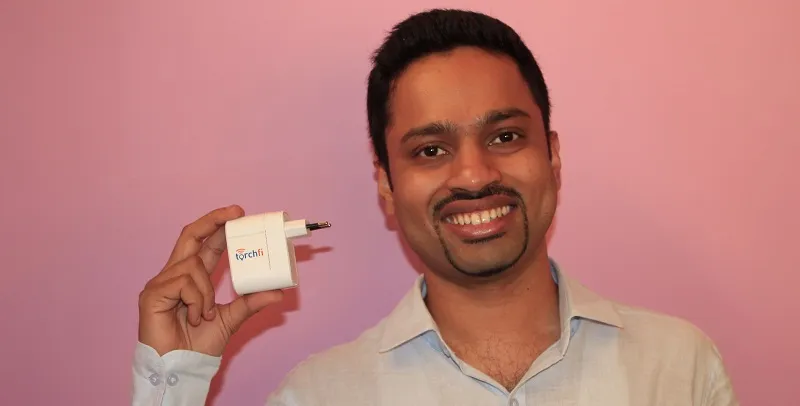[Startup of the day] Anup failed twice, but he is still in the race to succeed the third time with TorchFi
If one happens to enter a popular restaurant in the upmarket locale of Indiranagar, you would find that there are no waiters to take your order. The customer has to connect to the WiFi and the menu pops up on the screen of the phone. The customer is identified based on the table that generates the order and this information is captured at the order management system to complete the service.
The customer has to read through the menu and order what he needs. The next thing you know there would be a waiter bringing in the food from the kitchen and the drinks from the bar. This system reduces the need to hire additional waiters and reduces cost by streamlining the menu. It also manages the orders in the kitchen and reduces pilferage on the cash till. The customer can also make payments through the phone. The startup that provides this software interface is TorchFi, a Bengaluru-based company. "The technology takes advantage of the fact that there is too much human intervention in kitchens and in diners. With technology, the best people can be deployed to serve customers and thereby reducing cost," says Anup Balagopal, Founder of TorchFi, a WiFi-based analytics platform.

The early days
In October 2015, Anup set his sights on his third startup in six years. His experience - as an engineer working on mobile first solutions - was well documented over the last decade. He worked at OnMobile for five years before starting LeapSky ‑ a company that provided broadband access to consumers across the world through a WiFi hotspot device ‑ in Singapore. LeapSky raised money from several Indian angel investors. Unfortunately, the business did not gain acceptance - at the time - because their device play required additional money.
Anup, who had moved to Singapore in 2010, returned in 2012 and poured in over Rs 30 lakhs of his savings to build a platform that could capture customer footfalls in large corporate retail stores. He co-founded a company called Torchsight that was picked in the accelerator programme of a US retailer, which the company does not want to disclose as there was some seed fund invested and later written off. Torchsight helped the retailer to understand data capture of loyal customers in the store. All this was done by tracking the unique identity of the mobile phone.
"Unfortunately for us, we could not pursue the business because tracking the customer at the store and suggesting offers became a security issue. The retailer was not keen to explore a contract beyond a pilot study," says Anup. By then Anup was desperate to take this idea forward. He renamed the company to TorchFi and figured that this platform which brought rich intelligence to businesses - by bridging customer usage of the mobile and providing insight - could have an application in other consumer industries. TorchFi tweaked the software to capture the consumer usage of the business catalogue rather than track the customer over a life time.
In less than six months, the company is now piloting in three restaurants and has been selected to another accelerator programme. "I plan to take this idea global. The sales cycle in India takes longer and this product works best in SMBs in the mature market," says Anup.
The company is a five-member team with negligible revenues. Since the company has gone commercial only for the last six months it does not want to disclose revenues. It has a total of 10 customers that it is piloting with. However, it believes with increased adoption - adding 50 clients that pay for the service - it can reach revenues of Rs 6 crore in less than one year.
Competition
The business model of the company is based on a monthly subscription fee - for number of footfalls - and an annual maintenance contract.
MobStac and Mobmerry are some of the competitors in the retail side. Since this platform can be built for several applications, it can compete with the likes of CarIQ, LifePlot and TeeWee. The business model in the end is to use the data to provide automated insights. However, these businesses are still some way away from giving insights to large corporate customers. Only MobStac has cracked the US retail market and works with a dozen odd retailers in that region.
"Getting customers to use phones to order in a restaurant is a cultural shift. The restaurant owner should buy in to this concept in the first place and believe that this works," says R Natarajan, CFO of Helion Ventures.
That said this idea of using technology to solve retail and consumer pain points is here to stay. If the likes of Fresh Menu and Swiggy can do well in pockets of major cities, there is hope for such businesses too. The only problem in the business side being, winning customers takes a long time and TorchFi needs all the patience to succeed in the market that they serve, which is restaurants and retail stores. However, the idea can go global nevertheless. But Anup has already got a strategy in place for a global play.


![[Startup of the day] Anup failed twice, but he is still in the race to succeed the third time with TorchFi](https://images.yourstory.com/cs/wordpress/2016/08/Anup-Balagopal.jpg?mode=crop&crop=faces&ar=16%3A9&format=auto&w=1920&q=75)




